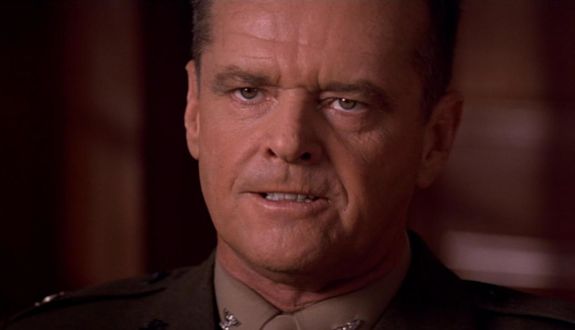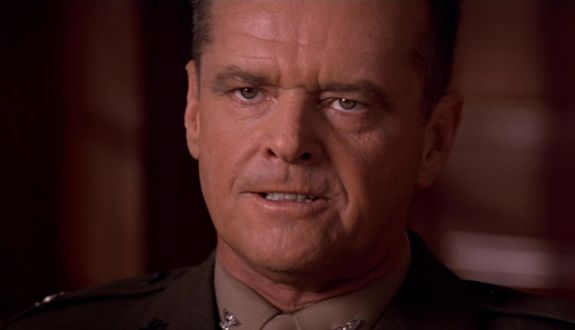The Greatest Lawyer Movies of All Time: A Few Good Men
- by
- Dec 31, 2016
- Entertainment, Legal Movies
- Reviewed by: Matt Riley


You’re a big boy/girl, so you quite likely can handle the truth.
This week, after months of procrastinating, I decided to pony up the requisite $7.99 and watch #14 on the ABA’s Top 25, perhaps the most iconic lawyer movie of the modern era. I want to say upfront that I will do my best not to make any “You can’t handle the truth!” puns, but I’m not 100% confident that I’ll be successful.
A Few Good Men
1992 dir. Rob Reiner
One of the staples of the lawyer movie subgenre is the epic cross-examination. It’s a natural climax: after each side has marshaled its evidence and taken its shots, the trial comes down to a one-on-one battle of wits. Cross-examinations are tests of argument – whose version of events stands more scrutiny? – but also of mental toughness. The ultimate coup for a movie lawyer is to “break” a witness, to manipulate them into a damaging admission.
In “A Few Good Men,” the final cross is particularly heightened because the lawyer and witness in question are Tom Cruise and Jack Nicholson. Cruise, playing a young, brilliant Navy lawyer, has been ranting and raving his way through the film, showcasing his ability yell dialogue both loudly and quickly and even working in a crack Jack Nicholson impression at one point. He’s ready for an acting showdown. Nicholson, for his part, has only appeared in a few scenes, but he’s been looming over the film, a human Chekhov’s gun. They’re on a collision course, a young, yelly unstoppable object and an older, even yellier immoveable force.
When they finally square off, the audience is treated to nearly 20 minutes of leading questions, dismissive denials, surprising lines of questioning that “better be going somewhere,” buttons that get pushed, tempers that flare, increasingly loud yelling, and the revelation of One Big Truth. It’s a satisfying finale, even if “A Few Good Men” as a whole is somewhat less so.
The film tells the story of a military trial for two Guantanamo Bay Marines who killed a fellow soldier in the middle of the night. According to prosecutor Kevin Bacon, the defendants gagged and poisoned the victim to keep him from ratting them out for shooting across the Cuban border. The defense team tells a different story: the Marines were merely following orders, carrying out a “code red” disciplinary directive that came from the top. The victim died by accident, they say, as the result of an underlying cardiac condition.
That defense team consists of Cruise as lead counsel and Demi Moore and Kevin Pollack as co-counsel. Cruise’s famous intensity carries over well into the courtroom proceedings, but both he and Moore are miscast. This is a Rob Reiner / Aaron Sorkin movie, after all, and when it’s not going for blunt melodrama, its full of jokes and little comic beats that Cruise can’t quite pull off. It feels like you’re watching him ham it up as a guest star on “Seinfeld” – he’s not bad, but it doesn’t feel right.
Meanwhile, the script – Sorkin’s first, based on his own play – has some major problems. I have to imagine the movie played much better in 1992: we now have a totally new set of associations with Guantanamo Bay, for example. Still, even for its time, “A Few Good Men” is ignorant about how the American military interacts with the rest of the world. The unsettling, murky “truth” that it tries to uncover is based on false premises and soggy logic.
Nonetheless, “A Few Good Men” is worth watching if, like me, you’re a fan of the lawyer movie genre and you’ve never seen it. It’s not a great film, but it’s an entertaining one, and it’s iconic for a reason.
Search the Blog

Free LSAT Practice Account
Sign up for a free Blueprint LSAT account and get access to a free trial of the Self-Paced Course and a free practice LSAT with a detailed score report, mind-blowing analytics, and explanatory videos.
Learn More
Popular Posts
-
logic games Game Over: LSAC Says Farewell to Logic Games
-
General LSAT Advice How to Get a 180 on the LSAT
-
Entertainment Revisiting Elle's LSAT Journey from Legally Blonde








